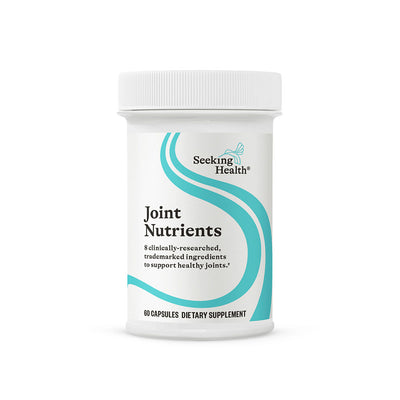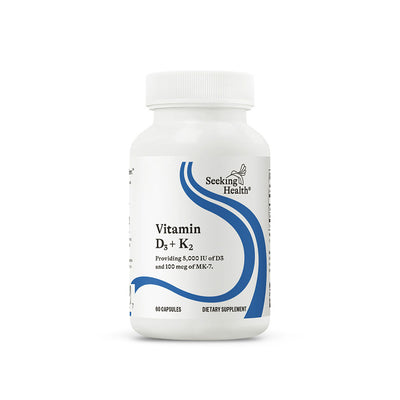Do you feel more tired than usual? Maybe you have trouble concentrating, lack motivation, or feel inundated with stress? If these signs do not resolve on their own, you may wonder if you could have adrenal fatigue.
The term “adrenal fatigue” is used to describe an increasingly common, yet sometimes controversial, health condition.
In this article we will explore some essential facts you need to know about adrenal fatigue.
What are Adrenal Glands?
Before you can troubleshoot what needs support with adrenal glands, it’s important to understand how they function.
The adrenal glands are essential for your everyday health. They are part of the body's endocrine system. (1)
Adrenal Gland Basics
- Small, triangular shaped organs that sit on top of the kidneys
- Produce vital hormones like cortisol, aldosterone, DHEA, androgenic steroids, epinephrine (adrenaline), and norepinephrine (noradrenaline)
- Regulate metabolism and support energy levels
- Support cardiovascular function
- Regulate normal immune system function
- Maintain blood pressure
- Manage the body’s stress response
- Regulate blood sugar levels
- Help manage inflammatory processes
The adrenal glands are designed to manage the stress response. This is sometimes referred to as “fight or flight.” But when the stress becomes chronic, kidney function changes, nutrient depletion may occur, and the adrenal glands may not have what they need to continue functioning optimally.
What is “Adrenal Fatigue”?
The term adrenal fatigue first became popular in 2001 after publication of the book Adrenal Fatigue: The 21st Century Syndrome. Written by James Wilson, ND, DC, PhD, an expert in alternative medicine, this book described the chronic fatigue and emotional stress burnout pattern that is commonly referred to as adrenal fatigue.
Now, 20 years later, homeopathic and naturopathic healthcare practitioners continue to explore this phenomenon.
Causes of “Adrenal Fatigue”
Adrenal fatigue is said to happen when the body is exposed to prolonged and repetitive stress. This stress affects the adrenal glands and reduces their production of vital hormones, including cortisol.
Cortisol is one of the primary hormones produced by your adrenal glands. It is naturally released into the bloodstream during times of stress.
Originally, when our ancestors (think cavemen) were faced with stressful or threatening situations (like being chased by a wild animal), cortisol activated the "fight-or-flight" response to allow them to protect themselves from harm.
Today, there are countless stressors that can burden the adrenal glands:
- Pandemics and illness
- Too many work emails or tight deadlines
- Driving kids from school to extra-curricular activities to camps and playdates
- Managing a busy home or career
- Being a caregiver
- Navigating dense traffic
These activities and more can trigger the release of the cortisol and other stress hormones. When your body doesn’t get a break, the side effects of a constant hormonal flood can lead to a depletion of nutrients that are necessary for the adrenal gland to function well. This may lead to various adverse health effects.
Not everyone who is chronically overwhelmed will feel this way. But in some cases, if you are chronically stressed and burnt out, you may be at risk for nutrient depletion and the symptoms of “adrenal fatigue” to set in.
Signs of “Adrenal Fatigue”
- Constant tiredness
- Feeling unable to wake up in the morning
- Unexplained weight changes (weight gain more common than weight loss)
- Brain fog (2)
- Salt and/or sugar cravings
- Irritability and low mood

Adrenal Fatigue: Myths vs. Reality
Adrenal fatigue is not recognized as a medical condition by the Endocrine Society or other medical guidelines. There are no laboratory tests to diagnose adrenal fatigue.
Because there are many health conditions that can cause extreme fatigue, other testing must be done to rule out potential underlying causes, such as:
- Thyroid dysfunction
- Nerve disorders
- Nutrient Deficiencies
Cortisol saliva testing or blood tests may be ordered by your healthcare provider. The results are a snapshot of your cortisol in that moment, and may or may not accurately reflect the whole picture of your symptoms.
Even though adrenal fatigue is not an official medical diagnosis, that does not mean that what you feel is not real. Symptoms like extreme fatigue can negatively affect your daily life.
The field of endocrinology, which manages hormones and the glands that make them, does not recognize adrenal fatigue. But endocrinologists still know how essential the adrenal glands are to human health.
Symptoms of “adrenal fatigue” may, in some cases, be due to something known as adrenal insufficiency.
Primary adrenal insufficiency is caused when the adrenal glands are damaged. This includes Addison’s disease.
Secondary adrenal insufficiency occurs because the adrenal glands are not told by the pituitary gland or hypothalamus in the brain, via the hormone ACTH, to make enough hormones. This can happen for many reasons, including withdrawal from steroid medications like prednisone.
Symptoms of adrenal insufficiency can vary depending on the cause. Sometimes it can be mistaken for “adrenal fatigue”.
Steps to Help Support Adrenal Health

There are many options when it comes to supporting the health of your adrenal glands. Alternative healthcare providers believe that “adrenal fatigue” can be handled and controlled with awareness and effort in adjusting the way that you live and respond under stress.
A healthy adrenal support program will include the following important changes and supports.
Lifestyle Changes
Your diet has a major impact on your health. Many healthcare practitioners will advise nutrition and lifestyle changes to support adrenal function. These may commonly include:
- Eliminate or reduce exposures to tobacco smoke, alcohol, and drugs
- Eat a nutrient-dense diet with plenty of protein and fresh fruits and vegetables
- Avoid sugary and processed foods
- Get regular physical activity
Healthy Sleep
While a good sleep routine is an important part of any lifestyle change, it’s in a category of its own for adrenal health.
Quality sleep is vital for supporting a normal circadian rhythm. Focus on going to bed and waking up at the same time each day. This can improve how your body processes stress and improve your adrenal gland health.
Healthy Stress Management
Chronic stress is not good for anyone, even without adrenal symptoms. There are many ways to improve how your body handles burnout and overwhelm, such as:
- Regular exercise
- Yoga and deep breathing
- Time in nature
Adrenal Support Supplements †
There are many nutrients that can support the normal function of the adrenal glands.†
- Vitamin C: This antioxidant nutrient is important because it helps the adrenal glands make cortisol. Under periods of overwhelm, they may use more vitamin C. Supplementing with vitamin C can help keep nutrient levels available for this important process. Not all vitamin C supplements are easily absorbed. But you only get benefits from supplements that your body can break down. Liposomal Vitamin C was formulated for optimal bioavailability.†
- Panthothenic Acid: Also known as vitamin B5, pantothenic acid supports normal hormone production in the adrenal glands. (3) All B vitamins, including vitamin B12 and folate, support the body’s ability to regulate a normal stress response. You can supplement with pantothenic acid on its own, or it is included in formulations like B Complex Plus, B Complex MF, and B Minus.†
- Zinc: A mineral that is vital for homeostasis (balance) in the body, zinc supports healthy immune system function and a normal stress response in the body. Zinc Lozenge contain chelated zinc for optimal bioavailability.†
- Adaptogens: Herbs that support the body’s normal stress response are called adaptogens because they help the body adapt to changing circumstances. They do not simply increase or decrease, but they help the body adjust to changes as needed to support balance. Because of this, they are considered excellent adrenal support. Adaptogens include herbs like ashwagandha, maca, rhodiola rosea, and cordyceps. Stress Nutrients contains vitamins, adaptogens, and other nutrients that encourage a normal adrenal gland response.†
- Adrenal cortex: Glandular adrenal cortex can provide support for those who want to support healthy adrenal function and balanced stress responses. Adrenal Cortex contains glandular tissue from grass-fed cows and may be taken daily for adrenal gland support.†
The Bottom Line
Constant stress can deplete the efficiency of the adrenal glands. “Adrenal fatigue” may occur when the adrenal glands are overworked and produce too little hormones, primarily the hormone cortisol. This can lead to changes in energy production.
Even though adrenal fatigue isn’t a medical diagnosis, you can still support healthy adrenal function with lifestyle changes, nutrients, and adrenal supplements.†












